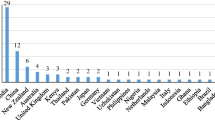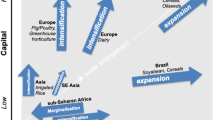Abstract
Amid discussions of an agricultural crisis and the failure of largescale, mechanized, capitalintensive development schemes in Nigeria, the Kofyar of Plateau State provide a case study of farmers spontaneously expanding food crop production for the market, using indigenous lowenergy technology. Temporary, followed by permanent, migration from the Jos Plateau homeland to frontier settlements on the fertile Benue plains has been accompanied by a change from initial shifting cultivation in forest clearings to permanent, intensively tilled and fertilized homestead fields. Labor is organized primarily in households that have grown in size and complexity. Cooperative and exchange work groups are also important for meeting seasonal bottlenecks and providing the careful, disciplined cultivation that intensive agriculture requires. Kofyar now devote up to 50% of their labor to cash crops, and they purchase considerable quantities of manufactured goods and medical services. Their uncoerced adaptation to an environment of new land resources and market incentives suggests both the advantages of indigenous development with a minimum of state control or interference and the limitations of a conventional dependency theory perspective.
Similar content being viewed by others
References
Andrae, G., and Beckman, B. (1985).The Wheat Trap: Bread and Underdevelopment in Nigeria. Zed Books, London.
Baldwin, K. D. S. (1957).The Niger Agricultural Project. Basil Blackwell, Oxford.
Bates, R. (1983).Essays on the Political Economy of Rural Africa. Cambridge University Press. Cambridge.
Berry, S. S. (1984).Farmers Work for their Sons: Accumulation, Mobility, and Class Formation in an Extended Yoruba Community. University of California Press, Berkeley.
Burnham, P. (1980).Opportunity and Constraint in a Savanna Society. Academic, New York.
Caldwell, J. and Caldwell, P. (1987). Famine in Africa. Unpublished paper for the Seminar on Mortality and Society in Sub-Saharan Africa, IFORD, Yaounde.
Charsley, S. R. (1976). The Silika: A cooperative labour institution.Africa 46: 34–47.
Cohen, R. (1989). The unimodal model: Solution or cul de sac for rural development? In Gladwin, C., and Truman, K. (eds.),Food and Farm: Current Debates and Policies.Monographs in Economic Anthropology, No. 7. University Press of America, Lanham, Maryland pp. 7–33.
Erasmus, C. (1956). Culture, structure, and process: The occurrence and disappearance of reciprocal farm labor.Southwestern Journal of Anthropology 12: 444–469.
Franke, R. W., and Chasin, B. H. (1980).Seeds of Famine: Ecological Destruction and the Development Dilemma in the West African Sahel. Allanheld, Osmun, Montclair.
Cleave, M. B. (1966). The changing frontiers of settlement in the uplands of northern Nigeria.Journal of the Geographical Association of Nigeria 8: 127–141.
Hart, K. (1982).The Political Economy of West African Agriculture. Cambridge University Press, Cambridge.
Hill, P. (1980).Population, Prosperity, and Poverty: Rural Kano 1900 and 1970. Cambridge University Press, Cambridge.
Hill, P. (1986).Development Economics on Trial: The Anthropological Case for the Prosecution. Cambridge University Press, Cambridge.
Hyden, G. (1980).Beyond Ujamaa in Tanzania: Underdevelopment and an Uncaptured Peasantry. Heinemann, London.
Hyden, G. (1986). The invisible economy of smallholder agriculture in Africa. In Moock, J. L. (ed.),Understanding Africa's Rural Households and Farming Systems. Westview, Boulder, pp. 11–35.
Iyegha, D. A. (1988).Agricultural Crisis in Africa: The Nigerian Experience. University Press of America, Lanham, Maryland.
Latour Dejean, E. de (1975). Transformation du Regime Foncier: Appropriation des Terres et Formation de la Classe Dirigeante en Pays Mawri (Niger). In Amin, S. (ed.),L'Agriculture Africaine et le Capitalisme. Editions Anthropos, Paris.
LeVine, R. (1966).Dreams and Deeds: Achievement Motivation in Nigeria. University of Chicago Press, Chicago.
Lewis, J. Van D. (1981). Domestic labor intensity and the incorporation of Malian peasant farmers into localized descent groups.American Ethnologist 8: 53–73.
Lipton, M. (1976).Why Poor People Stay Poor: Urban Bias in World Development. Harvard University Press, Cambridge.
Little, P. D., and Horowitz, M. M. (1987). Subsistence crops are cash crops: Some comments with reference to eastern Africa.Human Organization 46: 254–258.
Matlon, P. (1981). The structure of production and rural incomes in northern Nigeria: Results of three village case studies. In Bienen, H., and Diejomaon, V. P. (eds.),The Political Economy of Income Distribution in Nigeria. Hohnes and Meier, New York, pp. 323–372.
Meek, C. K. (1957).Land Tenure and Land Administration in Nigeria and the Cameroons.Colonial Research Studies No. 22. Her Majesty's Stationery Office, London.
Moore, M. P. (1975). Cooperative labour in peasant agriculture.The Journal of Peasant Studies 2: 270–291.
Moran, E. F. (1988). Social reproduction in agricultural frontiers. In Bennett, J. W. and Bowen, J. R. (eds.),Production and Autonomy: Anthropological Studies and Critiques of Development. University Press of America, Lanham, Maryland.
Mortimore, M. (1987). Shifting sands and human sorrow: Social response to drought and desertification.Desertification Control Bulletin 14: 1–14.
Netting, R. McC. (1964). Beer as a locus of value among the West African Kofyar.American Anthropologist 66: 375–384.
Netting, R. McC. (1965). Household organization and intensive agriculture: The Kofyar case.Africa 35: 422–429.
Netting, R. McC. (1968).Hill Farmers of Nigeria: Cultural Ecology of the Kofyar of the Jos Plateau. Seattle, University of Washington Press.
Netting, R. McC. (1987). Clashing cultures, clashing symbols: Histories and meanings of the Latok War.Ethnohistory 34: 352–380.
Netting, R. Mc.C. (1988). Agricultural Expansion, Intensification, and Market Participation Among the Kofyar, Jos Plateau, Nigeria. Paper for the Workshop in Population Growth and Agricultural Change in Sub-Saharan Africa, University of Florida, May 1–3.
Norman, D. W. (1969). Labour inputs of farmers: A case study of the Zaria Province of the North Central State of Nigeria.Nigerian Journal of Economic and Social Studies 11: 3–14.
Norman, D. W., Simmons, E. B., and Hays, H. M. (1982).Farming Systems in the Nigerian Savanna. Westview, Boulder.
Ottenberg, S. (1959). Ibo receptivity to change. In Bascom, W. R., and Herskovits, M. J. (eds.),Continuity and Change in African Cultures. University of Chicago Press, Chicago, pp. 130–143.
Reyna, S. P. (1987). The emergence of land concentration in the West African Savanna.American Ethnologist 14: 523–541.
Richards, P. (1985).Indigenous Agricultural Revolution: Ecology and Food Production in West Africa. Hutchinson, London.
Richards, P. (1986).Coping with Hunger: Hazard and Experiment in an African Rice-Farming System. Alien and Unwin, London.
Rimmer, D. (1981). Development in Nigeria: An overview. In Bienen, H., and Diejomaon, V. (eds.),The Political Economy of Income Distribution in Nigeria. Holmes and Meier, New York, pp. 29–87.
Rowling, C. W. (1946).Report on Land Tenure in Plateau Province. National Archives, Jos Provincial Files 2/27 3324, Kaduna.
Saul, M. (1983). Work parties, wages and accumulation in a Voltaic village.American Ethnologist 10: 77–96.
Shenton, R. W. (1986).The Development of Capitalism in Northern Nigeria. James Currey, London.
Stone, G. D. (1986). The Cultural Ecology of Frontier Settlement. Paper presented at the Meetting of the Society of American Archeology, April, 1986.
Stone, G. D. (1988). Agrarian Ecology and Settlement Patterns: An Ethnoarchaeological Case Study. Ph.D. dissertation, Department of Anthropology, University of Arizona, University Microfilms, Ann Arbor.
Stone, G. D., Johnson-Stone, M. P., and Netting, R. M. (1984). Household variability and inequality in Kofyar subsistence and cash-cropping economies.Journal of Anthropological Research 40: 90–108.
Stone, G. D., Netting, R. McC., and Stone, M. P. (in press). Seasonality, labor scheduling, and agricultural intensification in the West African savanna.American Anthropologist.
Stone, M. (1988a). Women doing well: A restudy of the Nigerian Kofyar.Research in Economic Anthropology 10: 287–306.
Stone, M. P. (1988b). Women, Work and Marriage: A Restudy of the Nigerian Kofyar. Ph.D. dissertation, Department of Anthropology, University of Arizona, University Microfilms, Ann Arbor.
Watts, M. (1983a).Silent Violence: Food, Famine, and Peasantry in Northern Nigeria. University of California Press, Berkeley.
Watts, M. (1983b). Good try Mr. Paul: Populism and the politics of African land use.African Studies Review 26: 73–83.
Watts, M. (1984). State, oil, and accumulation: From boom to crisis.Environment and Planning D: Society and Space 2: 403–428.
Author information
Authors and Affiliations
Rights and permissions
About this article
Cite this article
Netting, R.M., Stone, M.P. & Stone, G.D. Kofyar cash-cropping: Choice and change in indigenous agricultural development. Hum Ecol 17, 299–319 (1989). https://doi.org/10.1007/BF00889021
Issue Date:
DOI: https://doi.org/10.1007/BF00889021




